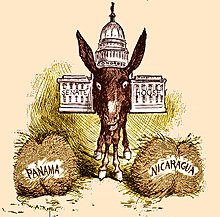Buridan's donkey

Buridan's donkey is a philosophical parable that can be traced back to the Persian philosopher Al-Ghazālī (1058–1111). In his main work The Incoherence of the Philosophers he writes:
"If a thirsty man can access two different glasses of water, which are the same for his purposes in every respect, he would have to die of thirst as long as one is not more beautiful, lighter or closer to his right hand [...]."
The Buridan's Paradox describes a similar situation that systemically represents a deadlock :
“A donkey stands between two equally large and equally distant haystacks . He eventually starves to death because he cannot decide which one to eat first. "
In the ancient
Anaximander already assumed that the earth would remain in place due to its cosmic equidistance. Even Plato makes Socrates in this way and explain ways, which is why the earth is moving.
At Buridan
The role in the philosophy and reception of Buridan's donkey is diffuse on several levels, starting with the fact that a parable with a donkey cannot be proven in the writings of Johannes Buridan (14th century), after whom it is named.
In his discussion of the Nicomachean Ethics of Aristotle, Buridan asks : “Would the will , placed in front of two completely identical alternatives, be able to prefer one alternative to the other?” Buridan answers this question negatively and confirms his position using the example of a wanderer at a fork in the road and a sailor in distress who has to decide whether to give up his cargo. Today it is believed that Buridan's opponents coined the above parable of the donkey to make this position appear absurd .
An analogous passage can be found in Buridan's commentary on Over the Sky ( Peri Uranu , also by Aristotle), where Buridan writes about a dog that cannot choose between two food sources. Again, confusingly, this original text by Aristotle deals with “a strand of hair that does not tear under strong tension from both sides, and a man who has to die standing between eating and drinking because he is exactly is equally hungry and thirsty. "
literature
- Nicholas Rescher : Choice without Preference. A Study of the History and of the Logic of the Problem of "Buridan's Ass" . In: Kant studies . 51, 1960, ISSN 0022-8877 , pp. 142-175. doi : 10.1515 / ed . 1960.51.1-4.142 .
- Tom Tyler: The Quiescent Ass and the Dumbstruck Wolf . In: Configurations . 14, No. 1, 2008, pp. 9-28.
Individual evidence
- ↑ Al-Ghazālī : Tahafut Al-Falasifah / Incoherence of the Philosophers . Translated by Sabih Ahmad Kamali, 2nd edition, Lahore 1963, p. 25 f. ( PDF; 13.9 MB ).
- ^ Rescher: Choice without preference . P. 144.
- ↑ Tyler: The Quiescent Ass and the Dumbstruck Wolf . P. 13.
- ^ Rescher: Choice without Preference . P. 153.
- ↑ Translated from Rescher: Choice without preference . S. 154. There: "Would the will, having been put between two opposites, with all being wholly alike on both sides, be able to determine itself rather to one opposed alternative than to the other?"
- ^ Rescher: Choice without Preference . P. 155.
- ^ Rescher: Choice without Preference . P. 154.
- ↑ Freely based on Aristotle: De Caelo / On the Heavens . Trans. WKC Guthrie, Heinemann, London 1938, 2: 13: 295b (p. 237). There: “the hair which, stretched strongly but evenly at every point, will not break, or the man who is violently, but equally, hungry and thirsty, and stands at an equal distance from food and drink, and who therefore must remain where he is. "